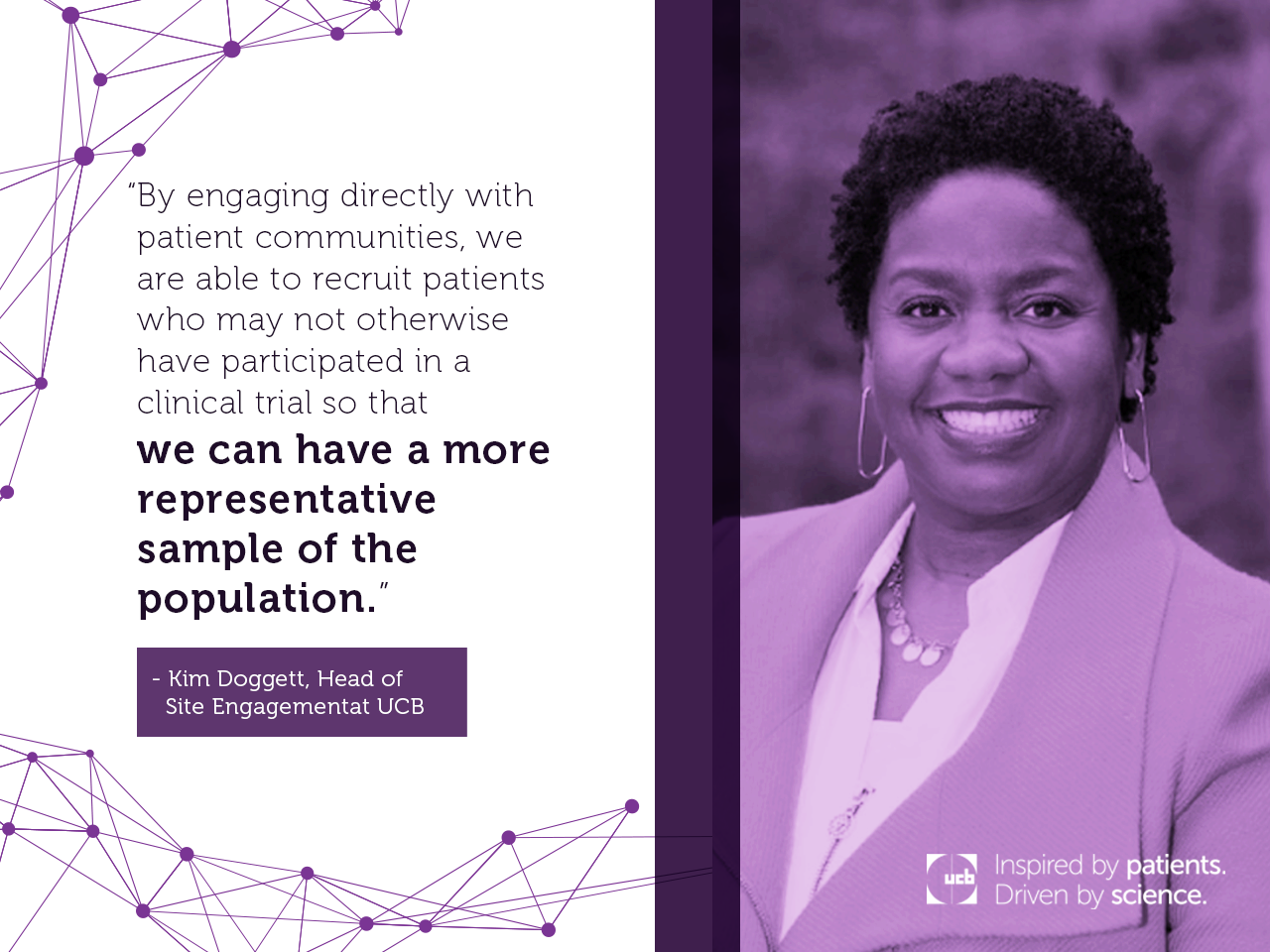
Diversity and inclusion in clinical trials is critical, and UCB is working to find new ways to connect to unique patient populations through our technological and data driven approaches. Kim Doggett, Head of Site Engagement, and her team focus on how they can provide value to patients by finding new ways to build relationships with clinical investigative sites to ensure we are reaching the targeted patient populations where we hope to provide meaningful solutions. Read more from Kim as she shares UCB’s diversity and inclusion approach to clinical trials.
'At UCB, we believe for our solutions to provide the best individual experience for patients, we must ensure our clinical trials are as diverse as possible to represent the differing experiences of individual patients. This means considering the diversity of our trials beyond just demographics in terms of race, gender, and other factors.
To become the patient-preferred biopharma leader, we must take new approaches to our clinical trials. One approach is through the implementation of decentralized clinical trials (DCT). DCTs offer the opportunity to make our clinical trials both more accessible and easier to participate in for patients. DCTs provide an alternative option for patients who may not be able to easily access a clinical trial and helps us to reach patients living with specific disease states in underrepresented territories. DCTs have helped us change how we approach the design of our trials, by focusing on reducing overall visits for the patient and instead increasing remote-friendly visits. While leveraging technology through telemedicine and mobile apps are valuable aspects of this, we have benefited from understanding that DCT studies are even more about finding the right combination of digital automation, clinical services (in and out of the clinic) and innovative study design. This ultimately allows patients to participate in trials that fit within the world in which they live.
Up until recently, we have depended solely on the principal investigator (PI) to lead a clinical trial and work with healthcare practitioners to get patients to a study. We are now using new technology allowing us to view anonymous electronic health records and other real-world data to look within regions to see pockets of people with a certain disease state. Within those pockets we can find a PI to open a site for those people who would be willing to participate in a clinical trial, and identify the referral physicians in the areas where trials are conducted. Having access to new patient populations allows us to gain a more robust understanding of patients who live with the disease states we serve.
Furthermore, having a PI to facilitate opening sites in areas of need is also a great opportunity to provide education about clinical trials. Once we locate the cities and pockets of patients that are underrepresented, we can work with the sites to bring in support for the patients whether its speaking at a church or community center or talking to a local pharmacy. By engaging directly with patient communities, we are able to recruit patients who may not otherwise have participated in a clinical trial so that we can have a more representative sample of the population.
UCB also focuses on reaching patients with our clinical study digital outreach campaigns by utilizing multiple digital channels, social networks, and awareness efforts across diverse populations and demographics. In a digital outreach campaign last year, UCB began a landscape mapping exercise of the countries in which UCB commonly conducts its clinical studies with the goal of focusing on diversity, chronic conditions, and rare diseases at country and region-specific levels. This provided a new way to identify who and where patient populations are.
Our data driven approaches, use of technology, and implementation of real-world evidence will help us find new patient populations, and more specifically, diverse patient populations to enable us to help specific groups of patients find solutions they value. The DCT model will bring new diversity opportunities for UCB, and exposure to clinical trials to people who may have never considered participating in a trial before. We look forward to continuing to look at the different ways we can provide value to patients in 2020 through our patient centric approach to clinical trials.'
Read the article on LinkedIn
About the Author
Kim Doggett is the Head of Site Engagement at UCB. She is passionate about strengthening the awareness and involvement of patients in clinical research. She has worked in the industry for 20 years with experience managing more than 36 studies across 6 development programs. Given her sensitivity to the lack of awareness about clinical trials and deepened community involvement, she has sought and gained invaluable industry insights to enhance the patient experience, notably establishing and maintaining key stakeholder relationships.
Choose Country
- Global Site – English
- Australia – English
- België – Engels
- Belgique – Anglais
- Brasil – Português
- България – Български
- Canada – English
- Canada – Français
- 中国 – 中文
- Česká Republika – Angličtina
- Danmark – Engelsk
- Deutschland – Deutsch
- France – Français
- España – Español
- Ελλάδα – Ελληνικά
- India – English
- Ireland – English
- Italia – Inglese
- 日本 – 日本語
- Казахстан – ағылшын тілі
- 한국 – 한국어
- Luxembourg – Anglais
- Luxemburg – Engels
- Magyarország – Angol
- México & Latinoamérica – Español
- Nederland – Engels
- New Zeeland – English
- Norge – Engelsk
- Österreich – Deutsch
- Polska – Polski
- Portugal – Inglês
- România – Engleză
- Россия – Русский
- Slovensko – Anglický
- Suomi – Englanti
- Sverige – Engelska
- Schweiz – Deutsch
- Suisse – Français
- Türkiye – Türkçe
- Україна – Англійська
- United Kingdom – English
- U.S.A. – English



